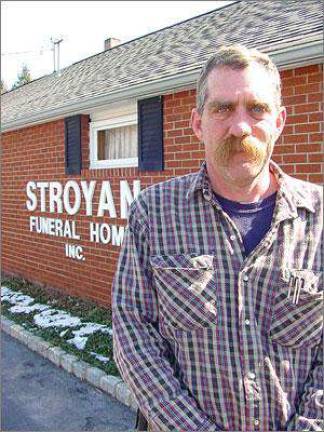Undertaking is a calling'

MILFORD - Kevin Stroyan always knew he was going to be an undertaker. Now a 30-year veteran of the family business, Stroyan said there was no particular moment or incident where the decision became evident to him. “I knew when I was 12 or 13. I grew up around it. I was going out on removals’ before I could drive,” he recalled. The Stroyans originally came to Milford to work as caretakers for the Pinchot family at Grey Towers. His father Duncan and his partner, James Crellin, got into the mortuary business in 1946 with their GI Bill money. Between them, they had nine children but Kevin Stroyan took over the business. “I’m the only one who’s stayed with it. Some of the siblings have helped out, but they didn’t want it for a steady diet. There’s not a lot of people who want a business they’re committed to,” he added. In a small town, at a “mom and pop funeral home” as he refers to the business, it does require a commitment. “You need to be available 24/7.” Stroyan has a younger associate, Chris Brighton, whose father was also in the business. “He’s got a feel for it. Some of the young people get into the business because they think there’s a lot of money in it, which isn’t true. But the ones who belong in it have a feeling for it. They’re good at it. It’s a calling. I can’t describe it,” he said. Brighton shares the call-out rotation schedule, but when someone dies around Milford, “I need to show up. The only time that’s not true is when I’m physically out of the area.” That’s true, in part because Stroyan also is the Pike County Coroner, although there is more to it. “The family expects to see me. People are spending their bucks and they want to see you. That’s the way it is,” he said. Stroyan’s father also was the county coroner and he remembers going on calls with his father as part of his growing up. Those memories are among those that come back quickest. “I remember the first (car) crash I went to.” And later, there was the first incision he made. “That’s something you remember because it’s really something we’re taught all of lives not to do. I guess anyone who ever uses a scalpel remembers that,” he said. It’s part of the job as is working with survivors in preparations, viewings and funerals. “You have to have empathy. People need someone to listen to them. They need ears. I’m concerned about what’s being said and seeing that the family is treated well.” All the more so since his customers are also his neighbors. “I can’t imagine working in a place where I didn’t know people.” Funerals have changed over the years. “It used to be that if it was a Catholic, a Lutheran or a Methodist funeral, you knew just what to do. Today there is no traditional funeral. It might be a spiritual or community oriented. There’s no set way of mourning.” A funeral is also a celebration of somebody’s life, he said. “Probably some of the most interesting services are of Native American families. They have a way of leaving you truly uplifted.” When it ends the mourners, “may not be happy, but they can leave feeling good,” he said. And that’s important. “When we go home at night and know that a family is comfortable, we did a good job.”